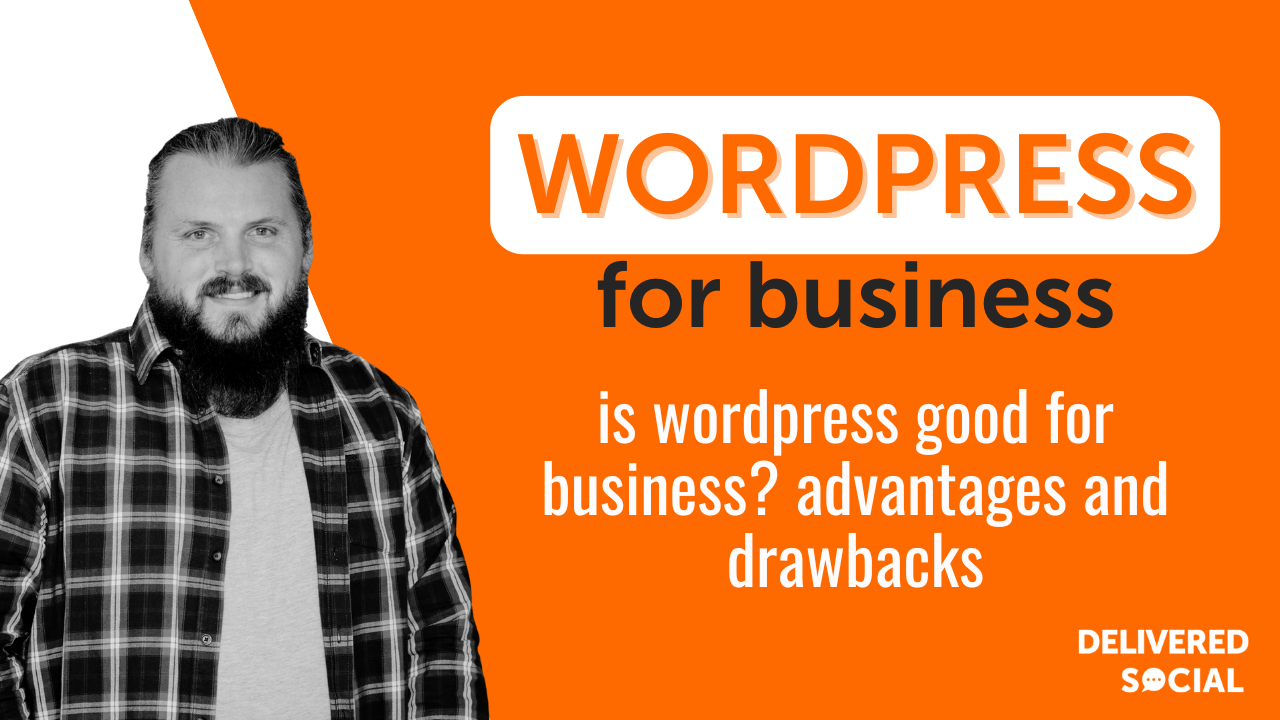
Choosing the right platform for your business website can directly impact how customers find and interact with your brand. Many companies ask, is WordPress good for business, especially when weighing cost, control, and scalability. WordPress powers millions of websites, from small local shops to large online stores, but that doesn’t mean it’s the best fit for every business. This article looks at where WordPress works well and where it may fall short. Whether you’re building a new site or thinking about switching platforms, understanding the pros and cons can help you make a more informed decision based on real needs.
User-Friendly Interface
WordPress includes a control panel that is simple to understand. Business owners who do not have coding skills can still manage their websites with ease. The layout of the dashboard is clear and organised. Tasks such as editing pages, adding content, or updating images can be done without help from a developer.
This system uses menus and buttons that guide users through each step. For example, creating a new post or uploading media only takes a few clicks. The platform also allows drag-and-drop features when using certain themes or page builders. This makes design changes faster and more manageable for those unfamiliar with web development.
The interface supports plugins that add extra functions without needing to write code. Owners can install tools for contact forms, SEO settings, booking systems, or online stores within minutes. These extensions often come with setup guides inside the dashboard itself.
Updates for software or plugins appear directly in the control panel. Users receive alerts when something needs attention, which helps keep sites running smoothly over time. Changes made on WordPress usually show up right away on the live site after clicking “update” or “publish.”
Menus offer access to every part of the website — from posts and pages to user roles and settings. Even if someone has never built a website before, they can learn how to handle WordPress by exploring these options.
For those asking is WordPress good for business, this level of control matters. It means fewer delays waiting on support teams and lower costs since many tasks stay in-house rather than being outsourced.
Businesses benefit from tools that save time while keeping things under control internally. WordPress delivers this through an interface designed around practical use instead of technical skillsets alone.

Customisation and Scalability
WordPress offers a large number of themes and plugins. These tools let businesses adjust their websites based on specific needs. A startup can begin with a basic layout, then add features as it grows. For example, an online store can start simple, then include product filters, payment options, or customer accounts over time.
Themes help define the look of a website. There are many free and paid options available. Businesses can pick one that fits their brand or industry. If needed, developers can change code to match exact requirements. This allows companies to avoid starting from scratch.
Plugins expand what a site can do without needing custom development at first. They cover tasks such as contact forms, booking systems, email signups, and SEO tools. As business goals shift, new plugins can be added or old ones removed without rebuilding the entire site.
Growth is possible without moving away from WordPress. For example, if traffic increases or more products get added to an online shop, the platform supports those changes with proper hosting and plugin choices. Companies don’t need to switch platforms just because they grow.
For teams that want control over design and function but lack technical skills, drag-and-drop builders like Elementor make updates easier without coding knowledge.
The question often asked is is WordPress good for business? Flexibility in structure makes it useful for both small operations and larger companies looking to expand online presence over time.
By using the right mix of themes and plugins—and adjusting them when needed—businesses stay efficient while avoiding extra costs from full redesigns or migrations later on.
Strong SEO Capabilities
WordPress includes features that support search engine optimisation from the start. Its structure is built to help pages load faster and organise content clearly. This helps search engines understand and index each page without confusion.
The platform works well with many SEO tools. Plugins like Yoast SEO or All in One SEO Pack allow users to manage titles, meta descriptions, sitemaps, and keyword usage directly within the dashboard. These tools also offer suggestions for improving on-page elements so that businesses can make their content more visible online.
Clean code is another key part of WordPress’s strength in this area. Sites made with WordPress often follow coding standards that search engines prefer. This means fewer errors and better indexing across all types of content — from blog posts to product pages.
Mobile responsiveness plays a role too. Many themes adjust automatically for smartphones and tablets, which supports mobile-first indexing used by major search engines today. Google favors sites that load correctly on smaller screens, so this feature can help increase rankings over time.
The ability to create custom URLs also adds value for businesses looking to target specific keywords or locations. Permalink settings give full control over how links appear, making them easier for both users and crawlers to understand.
For those asking is WordPress good for business, its built-in tools provide strong support for organic growth through visibility on platforms like Google or Bing. Businesses can update their sites regularly with new content while keeping technical performance in check using available plugins.
User-friendly dashboards let teams manage changes without advanced knowledge of coding or web development. Combined with regular updates from plugin developers, these features ensure ongoing compatibility with evolving search engine guidelines.
This flexibility allows companies of different sizes to tailor their SEO approach based on goals, audience behavior, and competition—all while staying within one system they already use daily.
Community Support and Resources
WordPress has a large number of users and developers around the world. This means there is a wide range of support options available for businesses using the platform. Whether someone is starting their first site or managing an established one, help is easy to find.
There are thousands of online discussions where people share advice, fixes, and methods to improve WordPress sites. Forums like WordPress.org provide answers on almost every topic related to setup, updates, themes, plugins, and security. These public spaces often contain step-by-step instructions shared by experienced users.
Video tutorials and written guides can be found across many websites. Platforms such as YouTube host countless walkthroughs explaining how to handle specific tasks within WordPress. These resources reduce the need for advanced technical knowledge because they break down actions into simple steps.
In addition to free content from the community, paid services also exist. Many professionals offer personalized support or full service management for business websites built on WordPress. Agencies and freelancers with years of experience in this field can take care of design changes, performance improvements, or regular maintenance.
Official documentation from WordPress itself gets updated regularly. It explains features in detail so that users can understand how each function works before applying it to their site. This helps avoid mistakes during setup or upgrades.
One reason many ask is WordPress good for business comes from its strong support network. Being able to find quick answers or hire skilled help adds value when time matters most.
Businesses can rely on this worldwide group not only when problems arise but also when they want new tools or better results from their website efforts.
Security Concerns and Maintenance Needs
WordPress powers many business websites. It is flexible and widely used, but it also needs regular care to stay secure. Many people ask, is WordPress good for business, especially when thinking about safety and upkeep. The answer depends on how well the site is managed.
Each WordPress site uses themes, plugins, and core files. These parts must be updated often. If updates are ignored, the website may become open to risks. Hackers often target old versions of software because they know where to find weak spots.
Website owners must check their sites regularly for issues. This means logging in often and applying updates as soon as they come out. Using strong passwords and limiting login attempts can also help keep the site protected.
Plugins add extra tools to a site, but not all plugins come from trusted sources. Installing unknown or outdated plugins can cause problems or provide access points for harmful code. Business owners should only use tools that come from verified developers.
Backups play a key role in keeping data safe during unexpected events. A full backup allows the website to be restored if something breaks or gets deleted by mistake. Setting up automatic backups saves time and reduces risk.
Some choose to manage these tasks themselves while others hire professionals or use managed hosting services that handle updates and security steps automatically. Either way, regular attention is needed.
WordPress can support a company website well if handled with care. Security depends on actions taken by those who run the platform daily rather than just by its design alone.

Is WordPress Good for Business? A Balanced Perspective
Many companies ask, is WordPress good for your business when choosing a platform. The answer depends on what the company needs and how much time or skill they can invest in setup and maintenance.
WordPress works well for many businesses because it offers options. Owners can build websites without paying developers. There’s a large library of plugins that help add features like contact forms, payment tools, or booking systems. These tools reduce the need to hire someone to code custom functions. This lowers costs and helps small teams move faster.
Flexibility is another reason why many use WordPress. It supports blogs, stores, portfolios, service pages, and more. Users can change themes or layouts without starting from zero. That allows companies to adjust their site as their goals shift.
However, not all businesses benefit equally from WordPress. Some may need special tools that don’t fit well with standard plugins or themes. For example, if a company handles private data or complex workflows online, it might need advanced security settings or custom-built solutions that go beyond what WordPress offers by default.
Maintenance also takes time. WordPress requires updates to plugins and themes often. If ignored, this leaves sites open to bugs or attacks. Businesses without someone handling these tasks may run into problems later.
Performance is another factor to consider. A basic WordPress site loads quickly with few visitors and simple content. But once traffic grows or media files increase in size, speed can drop unless the site is optimised regularly.
So while WordPress works well for many purposes—especially when cost matters—it isn’t always the best choice for every organisation type or goal set.
Some teams prefer platforms with built-in support features instead of managing updates themselves through third-party tools and providers like hosting services or plugin creators who may not offer direct help when something breaks down unexpectedly during peak hours of operation.
Making the Right Platform Choice for Business Growth
As we’ve explored, WordPress offers a compelling mix of user-friendliness, customisation, scalability, and strong SEO capabilities—making it a powerful tool for many businesses. Its vast community support and resource availability further enhance its appeal. However, ongoing maintenance and security considerations require attention to ensure long-term success. So, is WordPress good for business? For many organisations seeking flexibility and growth potential, the answer is yes—provided they invest in proper management. With the right strategy, WordPress can be a results-driven platform that supports both current needs and future expansion.
Interested In Working Together?
Introducing Delivered Social. We’re The Most-Rated Digital Agency In Surrey & Hampshire – We’ve Got To Be Doing Something Right.
Delivered Social is a digital marketing agency with one mission—to help businesses grow. We’re famous in Guildford and Portsmouth for our social clinics. We believe in free advice. We build lasting relationships because our team prides itself on being helpful, which our clients appreciate.
If you are looking for a new website or an agency to manage your social media presence, we can help.
If you need something slightly different, here's a super handy list of all our services, or you can always email us.























